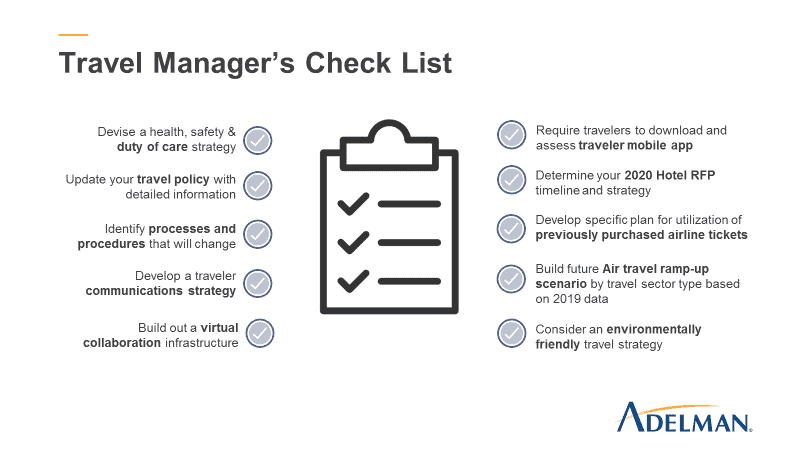Traveler Preparedness – Understanding the new normal and how to stay safe
May 1, 2020
Travelers and companies whose employees travel for work are considering what the new normal will look like post COVID-19. As we look to the future, getting back on the road will come with new procedures and measures for enhancing traveler safety; fewer person-to-person interactions, stricter sanitation requirements and a greater focus on the health and wellness of travelers will be a part of this new norm. There is no doubt that these unprecedented times will lead to some major changes in the travel industry and beyond.
Here are some of the new safety measures you will encounter once travel fully resumes:
TSA Rules and Recommendations:
The Transportation Security Administration (TSA) is encouraging all passengers to travel with hand sanitizer and alcohol or anti-bacterial wipes. Passengers can also expect to see more hand sanitizer at various touchpoints as well as workers disinfecting surfaces around the airport.
TSA has relaxed its rules to allow each traveler one hand sanitizer container of up to 12 ounces in their carry-on bag until further notice. However, hand sanitizer containers exceeding the standard 3.4-ounce allowance typically permitted through checkpoints are required to be screened separately.
Passengers are also allowed to wear face masks during the screening process. Keep in mind that travelers may be asked to adjust the mask so officers can visually confirm their identity when checking travel documents.
To avoid using a bin, it is recommended that travelers place any items from their pockets such as keys, tissues, loose change and cell phones into their carry-on bag, which will be screened by the X-ray system.
TSA also advises travelers not to panic if their driver’s license or state-issued ID expired on or after March 1, 2020, as officers will accept expired driver’s licenses or state-issued ID up to a year after expiration.
Lastly, TSA reminds travelers to wash their hands both before and after going through security checkpoints to help slow the spread of COVID-19.
At the Airport:
American Airlines is advising that they have temporarily closed or consolidated their premium clubs and lounges, and operating hours for those that are still open are subject to change. Additionally, AA ticket counter hours may change without notice, so they are advising passengers to check their flight status before going to the airport.
Delta Airlines is also consolidating gate operations and check-in counters at larger airports including Atlanta, Los Angeles and New York’s LaGuardia and JFK airports.
United Airlines has temporarily shut down self service kiosks in most locations and is asking passengers to self-scan boarding passes at their gate readers.
As part of a new check-in procedure on the airline’s website or app, Frontier Airlines is now requiring passengers to accept a health acknowledgement confirming that they have taken their temperature and have no fever, no one in their household has exhibited COVID-19 symptoms in the last 14 days, and they will wash and/or sanitize their hands before boarding.
On the international front, Emirates is now requiring passengers departing from Dubai to submit to a blood test prior to boarding. The blood test provides results within 10 minutes. Once cleared, passengers receive a COVID-19 certificate with the results.
On the Plane
Airlines have taken various steps to help passengers stay safe while adhering to social distancing guidelines.
American Airlines
Beginning in May, American will require flight attendents to wear masks, and starting May 11, passengers will be required to wear face masks when flying on the airline.
To comply with social distancing guidelines, American has updated food service and seat assignment procedures through May 31, 2020. They have limited food and drink service depending on the length of the flight, though passengers are still allowed to bring certain food and drinks onboard.
American has opened certain seating on their seat maps and closed access to other seats in order to provide more spacing between passengers. However, gate agents may need to move passengers at boarding to comply with social distancing recommendations.
Cleaning procedures
According to AA’s website, their cleaning procedures have always met or exceeded CDC guidelines. All planes undergo a deep cleaning procedure on a regularly scheduled basis. The airline has extended their cleaning protocols to include additional electrostatic spraying to disinfect planes with an EPA-registered, hospital-grade disinfectant. Most AA equipment has HEPA filters that completely change the air 15 to 30 times per hour. The airline has also provided all crew members on international flights with hand sanitizer and sanitizing wipes.
Delta Airlines
To help keep travelers and staff safe, Delta has implemented new procedures that will stay in effect through June. Their efforts include:
- Reducing the total number of passengers per flight
- Boarding only 10 passengers at a time and modifying the boarding process so passengers with assigned seats at the back are boarded first
- Blocking middle seats on all flights
- Suspending automatic advance Medallion complimentary upgrades. Instead, upgrades will be handled at the gate allowing the gate agent to take social distancing into consideration.
- Limiting food and beverage options. The airline encourages passengers to bring their own food and beverages on the flight.
Additionally, Delta is encouraging their own employees to wear masks. They are also blocking seats around flight attendant jump seats and providing hand sanitizer and wipes to in-flight and airport staff.
In addition to rigorously cleaning high-traffic areas in the airport and onboard the aircraft, Delta has begun fogging all flights with high-grade, EPA registered disinfectant. Many of their aircraft are equipped with state-of-the-art air filtration systems, which filter air through industrial-grade HEPA filters.
Southwest Airlines
Southwest has suspended all onboard beverage and snack service until further notice with the exception of one can of water on request. The airline is currently considering other changes including new boarding procedures, face mask requirements and passenger health screenings at security checkpoints.
Southwest puts all aircraft through a meticulous, six-hour cleaning every night. The overnight cleaning process has been enhanced to include the use of hospital grade disinfectant, which was previously used in the lavatories, throughout the entire aircraft. All Southwest aircraft are equipped with HEPA filters, which filter out airborne particles as the air onboard is recirculated with outside air, and a complete exchange of air and outside air is accomplished every three minutes. Additionally, the airline has begun using electrostatic sprayers to treat aircraft with disinfection and antimicrobial solutions.
United Airlines
United, which employs their own full-time, medical director, has employed the following new standards for in-flight safety:
- The airline is the first major U.S. carrier to require all flight attendants to wear a face covering. In response to the CDC’s recommendation to wear a face covering when social distancing is difficult to maintain, the airline will make face masks available to customers beginning in early May. United is also providing sanitizer to employees.
- Reduced food service and moved to pre-packaged foods and sealed beverages, suspending Buy on Board and adding more disposable cups so new cups can be used for refills.
- Limited seat selections in all cabins, so passengers will not be able to select middle seats or seats next to each other.
- Is boarding fewer customers at a time, back to front of plane, to allow for more distance during the boarding process.
- Starting May 5, processing Complimentary Premier Upgrades at the departure gate only, in priority order.
Cleaning
United aircraft are cleaned throughout the day with a high-grade disinfectant. The airline has now added electrostatic spraying to their cleaning procedures on all inbound long-haul international flights, and mainline overnight aircraft at their U.S. hubs. In June, all aircraft will have electrostatic spray on every departure, in addition to disinfecting customer touchpoints and surfaces before every flight. Additionally, all mainline aircraft use high-efficiency (HEPA) filters to circulate air and removes airborne particles.
In the Car
Travelers can limit their exposure to COVID-19 by relying on trusted ground transportation options. Adelman’s car rental partners are rigorously cleaning their vehicles between every passenger change. Additionally, employees working in branch and airport locations are following the recommendations of the various health authorities to reduce risk, including limiting the number of employees in a location and following social distancing guidelines. Enterprise, Hertz, Avis and National now sanitize all surfaces between every rental including seats, key fobs, steering wheel, cup holders, instrument panel, dashboard, doors and door handles. Additionally, Enterprise has consolidated operations to centralized locations and has implemented measures to immediately quarantine a vehicle if necessary.
Ride share companies have announced plans to distribute face masks and disinfectants to drivers, but individual drivers ultimately decide how and when to apply safety measures, making it more challenging to guarantee a clean environment. It is recommended that travelers avoid public transportation, but when a bus, train or metro is the only option, proper precautionary measures should be exercised.
At the Hotel
For most business trips, more time is spent in the hotel than any other part of the travel journey. Although hotel occupancy rates are currently at an all-time low, travelers will expect hotels to have enhanced their sanitation processes once they’re back on the road.
Many hotel chains including Hilton, IHG and Marriott, have announced new cleaning and sanitizing procedures including the use of electrostatic sprayers in some cases.
Hilton, in cooperation with the Mayo Clinic, is developing new cleaning protocols, training programs and quality assurance measures to ensure they are providing a safe stay for their guests. Extra cleaning measures include extra disinfection of frequently touched such as light switches and door handles, increased cleaning in public areas with an extra focus on fitness centers, and contactless check-in. The chain is also researching new cleaning technologies such as electrostatic sprayers and ultraviolet let.
Airbnb also recently announced new protocols for hosts, including enhanced cleaning and sanitizing guidelines and waiting periods between bookings.
If you have questions or concerns for when travel resumes, Adelman Travel can help you strengthen your traveler safety, health and wellness practices and policies. Contact your Adelman Travel Representative for more information.
Information Sources: Travelpulse.com, thepointsguy.com, American Airlines, Delta Airlines, United Airlines, Enterprise Holdings, Business Travel News, GBTA, TSA.gov







